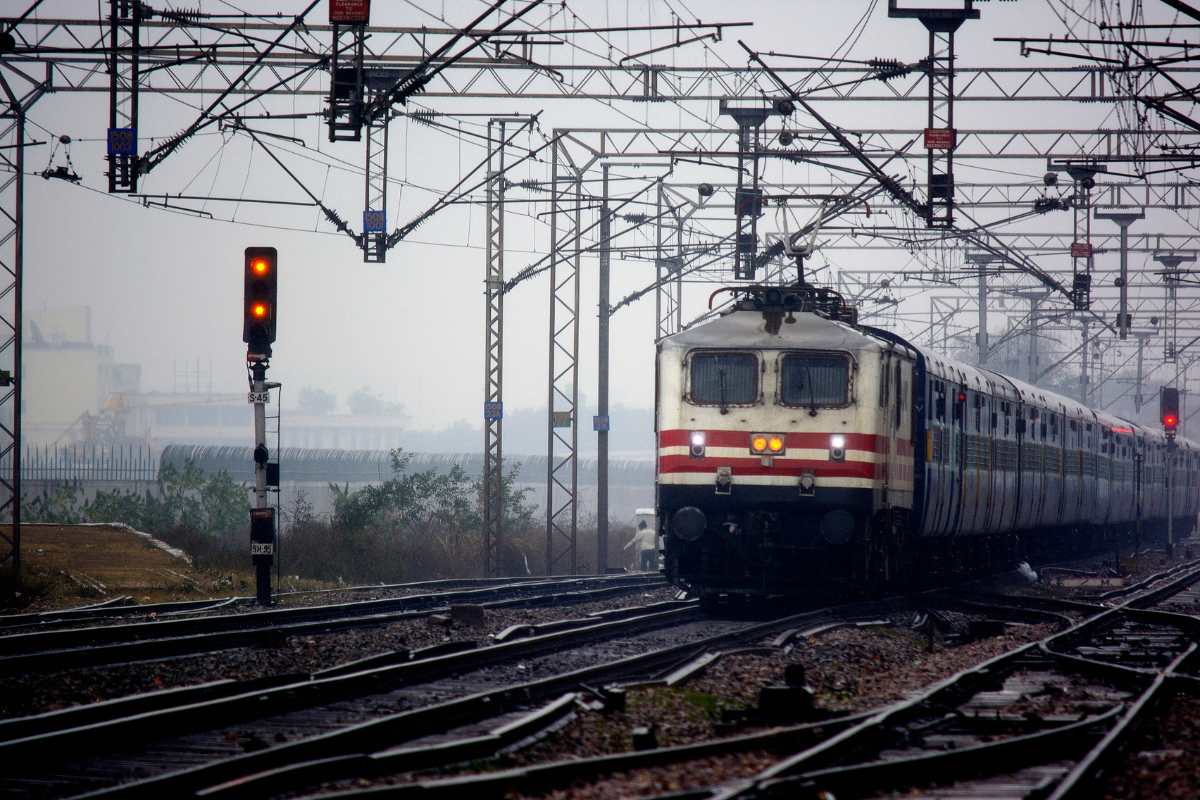Indian Railways (IR) stands as one of the world’s largest railway networks, spanning an extensive 67,415 route kilometres. It serves as the backbone of the nation, carrying a staggering 23 million passengers daily, ranking it as the world’s largest passenger transportation system. Furthermore, IR holds the fourth position globally for freight transportation, annually moving a colossal 1,225 million tonnes of cargo as it traverses the entire length and breadth of the country.
Rail-based transportation is notably the most environmentally friendly mass transit system, characterised by significant energy efficiency and resource optimization advantages. Railways exhibit approximately 12 times higher efficiency in freight traffic and three times higher efficiency in passenger traffic when compared to road transport. In light of India’s economic transition, marked by the pursuit of economic growth and sustainable development, mobility assumes a pivotal role. It has been projected that, to foster the sustainable development of the Indian economy, the inter-modal share of freight traffic carried by rail should increase from the current 36% to 45% by 2030. Consequently, Indian Railways is gearing up for substantial growth, intending to achieve this heightened inter-modal share through network expansion, enhancement of rolling stock fleets, and increased productivity.
To transform IR into a low-carbon mass transportation system that champions a green environment, an integrated approach, with resource efficiency at its core, becomes indispensable.
Recognising its role as the nation’s lifeline, the Railway Board established the Environment Directorate within Indian Railways in January 2015. This directorate serves as the central coordinating body for all environmental management initiatives undertaken by the railway network. Since its inception, Indian Railways has taken significant strides in streamlining its environmental management efforts, highlighted by key initiatives encompassing energy efficiency, the utilisation of renewable and alternative energy sources, water conservation, afforestation, waste management, and attainment of green certifications.
Here are some of the eco-friendly practices and green initiatives undertaken by Indian Railways recently:
- Electrification of tracks: Indian Railways has planned to electrify 100% of its broad gauge network by December 2023, which will reduce its dependence on diesel and save fuel costs. As of January 2021, it has electrified 42,354 route kilometres, which is 80.61% of the total network. Electrification also enables the use of regenerative braking, which feeds back the electric energy to the grid while slowing down the train.
- Renewable energy sources: Indian Railways has set a target of becoming a net-zero carbon emitter by 2030, by meeting its energy demand from renewable sources such as solar and wind. It has installed 142 MW of solar rooftop capacity and 103.4 MW of wind energy till August 2022, and has a pipeline of nearly 3,450 MW of renewable capacity. It also plans to use biofuels for blending with diesel, which will reduce emissions and dependence on fossil fuels.
- Water conservation and management: Indian Railways has taken several measures to conserve water and use it efficiently, such as rainwater harvesting, recycling of wastewater, installation of water metres, use of water-efficient appliances, etc. It has also fitted bio-toilets in trains, which prevent the discharge of human waste on the tracks and improve sanitation.
- Afforestation and waste management: Indian Railways has undertaken massive tree plantation drives on its land, which increase the carbon sink and enhance biodiversity. It has also implemented waste management and pollution control measures, such as segregation of waste, composting of organic waste, disposal of hazardous waste, etc. It has also contributed to the Swachh Bharat Mission by ensuring cleanliness and hygiene in its premises.
- Green certifications: Indian Railways has adopted green building standards and practices for its stations, offices, workshops, and other establishments. It has obtained green certifications from various agencies such as GRIHA, IGBC, CII, etc., which recognises its efforts towards environmental sustainability.
Indian Railways has embarked on a journey of eco-friendly initiatives and continues to explore many more. To truly appreciate these efforts, consider experiencing them firsthand by booking your train tickets online from any location. Online train ticket booking is a convenient and hassle-free way of travelling by rail in India. It allows passengers to book their seats in advance and avoid the long queues at the railway stations. Online train ticket booking can be done through various platforms, such as the official website of Indian Railways, IRCTC, or other authorised agents and apps. One of the important features of online train ticket booking is the PNR, which stands for Passenger Name Record. PNR is a unique 10-digit number that is generated when a passenger books a train ticket online. It contains the details of the passenger, such as name, age, gender, seat number, coach number, train number, date of journey, etc. PNR helps passengers to check the status of their booking, such as confirmed, waitlisted, or cancelled. PNR also helps in tracking the live location of the train and getting alerts about any delays or changes in the schedule. PNR can be checked online through various websites or apps, or by sending an SMS to 139. Online train ticket booking and PNR make travelling by rail easier and more comfortable for passengers.
To book online train tickets choose redRail. redRail is an online train ticket booking app that is powered by redBus, the largest online bus ticketing platform in India. redRail is an authorised partner of IRCTC, the official website of Indian Railways, and offers a fast and easy way to book train tickets online. With redRail, you can:
- Search for trains across all routes and classes
- Check seat availability and fare details
- Book confirmed or waitlisted tickets
- Pay securely using various modes such as UPI, credit card, debit card, net banking, etc.
- Check PNR status and live train status
- Get instant refund on UPI payments
- Avail exciting offers and discounts on train tickets.

 ‘All Eyes On POK’: Elvish Yadav Satire On Celebs Supporting Rafah, Ignore Issues Closer To Home
‘All Eyes On POK’: Elvish Yadav Satire On Celebs Supporting Rafah, Ignore Issues Closer To Home Patna University Murder Video: Student Harsh Raj Brutally Beaten To Death By Masked Men
Patna University Murder Video: Student Harsh Raj Brutally Beaten To Death By Masked Men Bobby Kataria Arrested For Human Trafficking; Other Pending Cases Against Him Explored
Bobby Kataria Arrested For Human Trafficking; Other Pending Cases Against Him Explored Indian Soldiers Won in Tug-of-War with Chinese Soldiers at UN Peacekeeping Mission in Sudan: Watch the Viral Video!
Indian Soldiers Won in Tug-of-War with Chinese Soldiers at UN Peacekeeping Mission in Sudan: Watch the Viral Video! Prajwal Revanna To Appear Before SIT On May 31, Apologize To Parents In A Video Release
Prajwal Revanna To Appear Before SIT On May 31, Apologize To Parents In A Video Release WATCH: AAP Punjab Minister Balkar Singh, in Obscene Video Call Viral; BJP and SAD Demand Action
WATCH: AAP Punjab Minister Balkar Singh, in Obscene Video Call Viral; BJP and SAD Demand Action New Footage Of The Tragedy At Rajkot’s Game Zone that killed 27 Emerges
New Footage Of The Tragedy At Rajkot’s Game Zone that killed 27 Emerges Pradhan Mantri Kaushal Vikas Yojana 2024 Online Application, Courses List, Eligibility Criteria and All You Need To Know
Pradhan Mantri Kaushal Vikas Yojana 2024 Online Application, Courses List, Eligibility Criteria and All You Need To Know